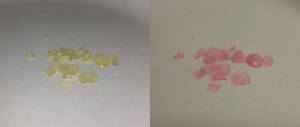Holmium citrate
 Holmium citrate under LED and CFL lighting.
| |
| Names | |
|---|---|
| IUPAC name
Holmium(III) 2-hydroxypropane-1,2,3-tricarboxylate
| |
| Systematic IUPAC name
Holmium(III) citrate | |
| Properties | |
| C6H5O7Ho | |
| Molar mass | 354.03002 g/mol |
| Appearance | Yellow or pink solid (depending on the illumination source) |
| Odor | Odorless |
| Melting point | 309.6 °C (589.3 °F; 582.8 K) (decomposes) |
| Boiling point | Decomposes |
| Soluble | |
| Solubility | Insoluble in halocarbons, hydrocarbons |
| Vapor pressure | ~0 mmHg |
| Hazards | |
| Safety data sheet | None |
| Except where otherwise noted, data are given for materials in their standard state (at 25 °C [77 °F], 100 kPa). | |
| Infobox references | |
 |
This article is a stub. Please help Sciencemadness Wiki by expanding it, adding pictures, and improving existing text.
|
Holmium citrate (C6H5O7Ho) is the holmium salt of citric acid. It is prepared by addition of a stoichiometric amount of holmium metal to a citric acid solution. It is yellow in sunlight, incandescent light, or LED light and bright pink under the light of compact fluorescent lights.
Contents
[hide]Properties
Chemical
Heating holmium citrate will cause it to decompose, yielding carbon oxides and leaving behind holmium carbonate or oxide.
Physical
Holmium citrate changes its color depending on the light source.[1]
Preparation
Adding holmium metal to citric acid solution yields holmium citrate.
Projects
- Color changing solution
- Catalyst for polyester production[2]
Handling
Safety
The compound appears to be safe to handle without protection. Holmium has a low level of acute toxicity, and large amounts are needed to cause toxic effects.
Storage
Should be kept in closed containers, as it absorbs water from air.
Disposal
Since holmium is expensive, it's best to try to recycle it.
References
- Jump up ↑ https://www.youtube.com/watch?v=jhepi81HBqE
- Jump up ↑ http://www.google.com/patents/CN100469814C?cl=en